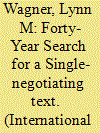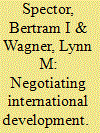| Srl | Item |
| 1 |
ID:
099818


|
|
|
|
|
| Publication |
2010.
|
| Summary/Abstract |
This article draws on principal-agent theories in the international organization literature and postagreement negotiation analysis in the negotiation literature to examine a case of international development negotiations among parties to the United Nations Convention to Combat Desertification. The role of the "collective principal" - the negotiating body of state actors that creates an international organization - is described and the analysis examines subsequent negotiations when the parties, as principal, do not coalesce into a collective actor regarding the mandate for the organization - or agent - they created. The article suggests that postagreement negotiation analysis provides an understanding of the vehicle through which the "principal" provides "collective" oversight of the agent, and examines what we label the "regime interpretation" negotiations involved with this case.
|
|
|
|
|
|
|
|
|
|
|
|
|
|
|
|
| 2 |
ID:
123689


|
|
|
|
|
| Publication |
2013.
|
| Summary/Abstract |
AbstractThis article elaborates on the place of the United Nations Conference on Sustainable Development (UNCSD, also known as Rio+20) in a forty-year trajectory of international sustainable development negotiations, particularly through the processes placed in motion during the 1992 Rio Earth Summit event. The negotiation of the final UNCSD document also can be evaluated in its own right, and the article examines this process in the second section, keeping in mind the negotiating system in which the talks took place. The final section focuses on the process as a post-agreement negotiation and considers the role of the twenty-year milestone negotiations in shaping the sustainable development regime. The article explores in particular the role that consensus negotiated agreements have played as the regime's decision-making procedure, and how this procedure has faltered as the complexity - including the number of issues, actors and obligations incorporated into the regime - has increased. Two elements from the Rio+20 outcome - a "take-it-or-change-it" facilitation approach of the Brazilian hosts and the adoption of a process to create "sustainable development goals" as a different means to focus international expectations - are presented as new directions for decision making in the regime's next rounds of regime governance and regime adjustment negotiations.
|
|
|
|
|
|
|
|
|
|
|
|
|
|
|
|
| 3 |
ID:
099813


|
|
|
|
|
| Publication |
2010.
|
| Summary/Abstract |
Negotiation over international development assistance is an understudied but frequently practiced form of international dialogue. The primary issues involve financial, technical, logistical and physical support provided by developed countries or multilateral organizations to developing countries. But the process, strategies and structure of negotiation often need to cope with the complexities of diverse interests, issues of sovereignty and governance, power asymmetry, post-conflict stabilization, democratic transitions, coalition building, and conditionalities, among others. This collection of articles demonstrates the array of issues, contexts, and problems confronting practitioners involved in negotiating international development aid.
|
|
|
|
|
|
|
|
|
|
|
|
|
|
|
|